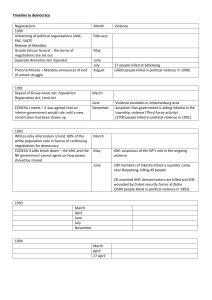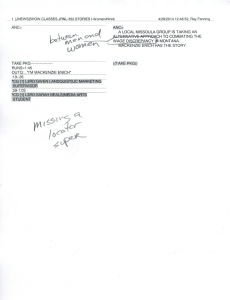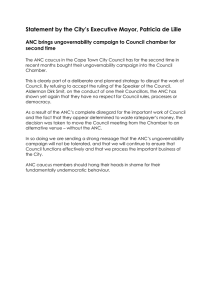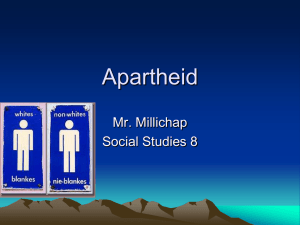South Africa's Transition to Democracy: Negotiations & Key Events
advertisement
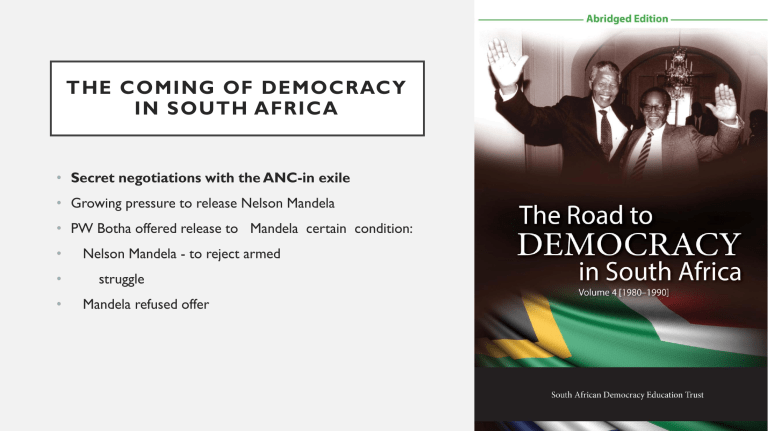
THE COMING OF DEMOCRACY IN SOUTH AFRICA • Secret negotiations with the ANC-in exile • Growing pressure to release Nelson Mandela • PW Botha offered release to Mandela certain condition: • • • Nelson Mandela - to reject armed struggle Mandela refused offer PW Botha met Mandela for first time -1989-Justice Minister, Kobie Coetzee, described the meeting as a ”courtesy meeting” Positive sighn-possibility of negotiations between ANC and the NP Discussions were at the same time between ANC - in exile and prominent white businessmen of SA N E G OT I AT I O N S WITH MANDELA (1989-1991) Anglo American CEO Gavin Relly met with ANC members in Lusaka-1985 1987 –Frederick van Zyl Slabbert led a delegation of 52 Afrikaans-speaking South Africans to meet with ANC in Dakar PW Botha had a stroke in 1989, decided to stand down as leader -De Klerk was elected as leader of the NP 1989-1991 : UNBANNING OF O R G A N I S AT I O N S A N D R E L A E A S E OF POLITICAL PRISONERS • Dramatic speech – 2 February 1990 • De Klerk announced: • Unbanning of political parties (ANC, PAC and SACP) • Release of some political prisoners • Intention of government to enter negotiations with ANC 11 FEBRUARY 1990: MANDELA WAS RELEASED FROM VICTOR VERSTER PRISON The NP decision to enter negotiations with the ANC NP lost many supporters-to the Conservative Party Conservative Party was against NP’s decision to enter negotiations with ANC DEBATES AROUND NEGOTIATIONS ANC decision to enter negotiations with the NP not all members welcomed decision For many ANC members the thought of negotiating with the enemy was not an option Chris Hani radical ANC Leader (leader of Umkhonto we Sizwe (MK) -was against negotiations Questioned the government’s commitment to negotiations ‘TALKS ABOUT TALKS” Government and ANC hold meetings –discussed how negotiations would go ahead This period (Feb 1990-Nov 1991) – period known as “Talks about Talks” Compromise on both sides. Sebokeng killings: Police opened fire on protestors-killing 14 people Protest was against high rents and racially segregated local facilities First set of talks between NP and ANC (11 April 1990 ) were cancelled -ANC withdrew from meeting because of the violence in Sebokeng • NP and ANC met at the president’s residence in Groote Schuur-Cape Town • Discussed challenges of negotiations • Wanted to keep good communication channels- between ANC and NP • Both parties commit themselves to peaceful negotiations • This agreement became known as the Groote Schuur Minute • Pretoria Minute: (August 1990) Further talks were held on 6 August -The Pretoria minute was signed • Government announced: Government end the state of emergency • Release more political prisoners ;Allow return of political exiles to SA • ANC- suspended armed struggle GROOTE SCHUUR MINUTE: (MAY 1990) D E B AT E S ARO UN D N E G OT IAT IONS : CODESA 1: Representatives of 19 political parties met December 1991 Formed the Convention for a Democratic South Africa (CODESA) PAC and CP did not attend Meetings at World Trade Centre in Kempton Park Discussed issues: new Constitution and power sharing (interim government) It was agreed that an interim constitution would be drawn up by representatives from a variety of political parties Delegates of CODESA 1 signed- Declaration of Intent : -Outlined the aims of negotiations -peaceful, fair and free elections “WHITES ONLY’ REFERENDUM De Klerk was concerned –loss of NP supporters NP lost three byelections to Conservative party De Klerk decided to hold a referendum – white voters Question: Should government continue negotiations with ANC? 68% of white voters in favour of negotiations De Klerk continued with the negotiations May 1992 talks resumed at CODESA 11 Talks stalled – failure to reach consensus on an interim government Adding to the tension at the talks was the government’s insistence that the ANC disband the MK and that members hand over their weapons to security forces CODESA 2 June 1992 – Boipatong massacre-46 people were killed The suspected perpetrators were IFP hostel dwellers ANC walked out of the negotiation process- because of government’s involvement in causing violence against ANC members . Breakdown of negotiations-The ANC took to the streets with a program of ‘rolling mass action’. RECORD OF UNDERSTANDING Major crisis of 1990’s: violence that threatened to spiral out of control Cyril Ramaphosa (ANC) and Roelf Meyer (NP)-important role players Continue to meet to keep negotiations going ANC and NP: 26 September 1992 –signed Record of Understanding-Shows commitment of NP and ANC NP agreed: -to ban the carrying of traditional weapons ;erect fences around migrant hostels;-release more political prisoners ANC: agreed that all parties that received 5% or more in the elections would be part of this Government of National Unity (GNU) Joe Slovo proposed the Government of National Unity-this proposal was known as the “Sunset Clause” MURDER OF CHRIS HANI AND THE I M PAC T O N T H E N E G OT I AT I O N P RO C E S S 10 April 1993: Chris Hani Secretary of SACP was assassinated Popular and charismatic Chief of Staff of Umkhonto we Sizwe Shock, horror and unrest sparked through South Africa- more than 70 people lost their lives Archbishop Desmond Tutu described the time after Hani’s death as “one of the most scary moments in our country’s history” Mandela addressed the nation on television on 13 April 1993 - appealed for calm Final turning point: renewed vigour in negotiations Representatives of various parties resumed discussions Multi-party Negotiation Forum – election date-27 April 1994 ON G O IN G V I O L E NCE -AT TE M PTS TO D E R AI L NEG OTIATIONS 1992-1994: Ongoing violence In KwaZulu Natal and Witwatersrand Between ANC and IFP supporters The AWB and the PAC’s armed wing (APLA) attempted to disrupt the negotiations through violence Afrikaner Weerstandsbeweging (AWB) –leader Eugene ‘Terra’Blanche 25 June the AWB , led by Eugene ‘Terra’Blanche, launched an attack on the World Trade Centre in Kempton Park Drove the armoured vehicle into reception area of the building Took delegates of the Multi-Party Negotiation Forum hostage AWB failed to end the negotiations Azanian People’s Liberation Army (APLA): 26 July 1993- APLA attacked the St. James Church in Kenilworth, Cape Town Using grenades and AK-47s VIOLENCE 11 members of Congregation were killed, 58 wounded • Known as the St James Massacre • Heidelberg Tavern Massacre An attack on the Heidelberg Tavern - Observatory, Cape Town - December 1993 4 people were killed FINAL ROAD TO DEMOCRACY-1994 Fall of Lucas Mangope, Oupa Gqozo and Bophuthatswana shootings March 1994 AWB members went to the assistance of Bophuthatswana leader, Lucas Mangope Mangope was against Bophuthatswana’s reincorporation into SA Mangope’s own army had risen against him AWB were unsuccessful and Mangope was deposed as leader of Bophuthatswana Oupa Gqozo, leader of Ciskei, seeing Mangope’s removal from power, resigned a few days later Inkatha Freedom Party march to Shell House 20000 IFP supporters-march to ANC ‘s headquarters ANC security opened fire-killing 19 Many South Africans did not believe peaceful elections would be possible THE CONSTITUTION AND THE BILL OF RIGHTS After months of tense negotiations – Interim Constitution was approved in December 1993 The Interim Constitution allowed considerable powers the provinces The Interim Constitution was approved by the Constitutional Assembly in May 1996 Constitutional Court shocked South Africa by rejecting the new Constitution -8 clauses clashed with the constitutional principles The new Constitution was sent back to the Constitutional Assembly 0n 4 December 1996 -new constitution was approved -objections from DP, IFP and other parties were dismissed Nelson Mandele signed the Constitution of South Africa - 10 December 1996 in Sharpeville New constitution came into force on 4 February 1997 –took 5 years -500 people were involved One of the most important parts of the Constitution is the Bill of Rights March 1994- IFP and Freedom Front –it appeared both parties would not contest in the elections Mr Mandela met with both leaders Freedom Front agreed to participate 4 days before election: IFP decided to take part Stickers bearing the IFP logo and Buthelezi’s photograph had to be added to over 40 million ballot papers Elections began on 27 April 1994-three days 20 million people voted 27 April is now celebrated as “Freedom Day” GOVERNMENT OF NATIONAL UNITY • Formed on 10 May 1994-in spirit of reconciliation • Political parties work together – stability • Nelson Mandela: first black president • Thabo Mbeki -First Deputy President • F.W. de Klerk : Second Deputy President
